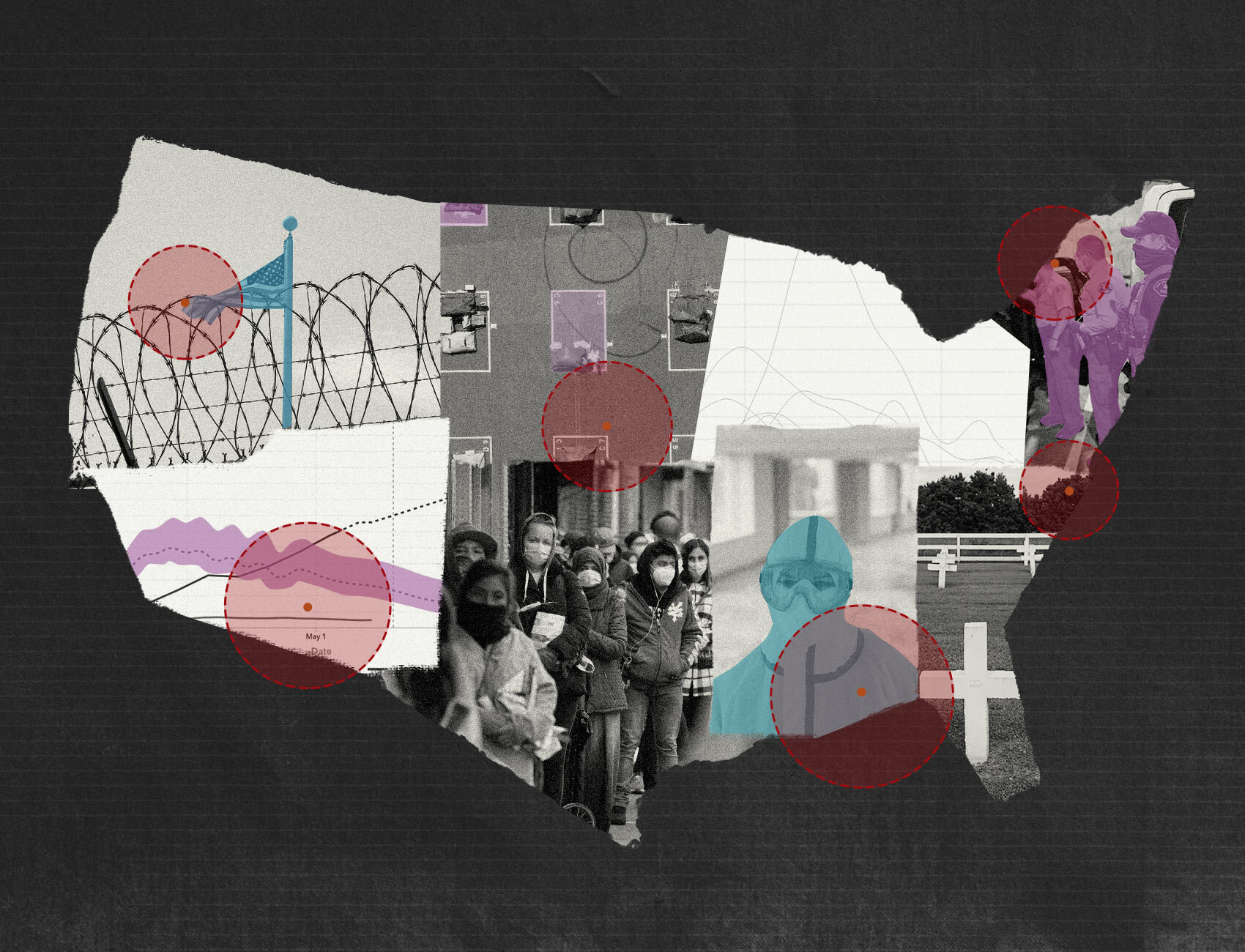Coronavirus In Jails And Prisons
After being COVID-free for months, Massachusetts facilities see new outbreaks; a New York lawmaker wants to make it easier for people to serve prison and jail sentences at home; and deaths continue to plague a Virginia prison.

Weeks before the first reported cases of COVID-19 in prisons and jails, correctional healthcare experts warned that all the worst aspects of the U.S. criminal justice system—overcrowded, aging facilities lacking sanitary conditions and where medical care is, at best, sparse; too many older prisoners with underlying illnesses; regular flow of staff, guards, healthcare workers in and out of facilities—would leave detention facilities, and their surrounding communities, vulnerable to outbreaks. Despite those early warnings, even jails and prisons that believed they were well-prepared have seen a rapid spread of the virus. Over the next several months, The Appeal will be examining the coronavirus crisis unfolding in U.S. prisons and jails, COVID-19’s impact on surrounding communities and how the virus might reshape our lives. Read recent posts.
New England corrections facilities have remained nearly coronavirus-free over the last few months—until late last week. Massachusetts corrections officials reported outbreaks at the Middleton jail in Essex County, about 20 miles north of Boston, and at the Massachusetts Alcohol and Substance Abuse Center (MASAC) in Plymouth.
The jail is reporting that 25 prisoners, 21 employees, and two contractors have tested positive for COVID-19. At MASAC, 28 of 97 men confined to the treatment facility tested positive. The outbreaks come amid a statewide spike in new cases.
While MASAC is part of the state’s prison system, it’s not exactly prison. For someone to end up there, a judge must find that the individual’s addiction to drugs or alcohol causes him to be a danger to himself or others. In 2019, a group of men at MASAC sued the state, arguing it was discriminatory for men, but not women, to be involuntarily committed to a correctional facility for treatment. The lawsuit described conditions in the treatment facilities as “appalling.” Commonwealth Magazine reported on Friday that the DOC has halted all new admissions to MASAC and will instead be sending anyone subject to a civil commitment to a different facility.
Because of decisions made earlier in the year, the wave of new cases may soon spread to other facilities in the state. In April, Prisoners’ Legal Services of Massachusetts filed a class-action lawsuit arguing for the release of people from state prisons to allow for adequate social distancing. While the lawsuit was filed on behalf of all people incarcerated in Massachusetts prisons, it focused on two subclasses: people at high risk of serious complications or death from COVID-19 and people who were civilly committed to a correctional facility. In June, the Massachusetts Supreme Judicial Court declined to order any immediate releases. Instead, the court referred the case to the state’s Superior Court and mandated that the risk of a person contracting COVID-19 needed to be taken into account before a person could be ordered into treatment.
Today, New York’s Jamestown Post-Journal reports that state Assemblyman David Weprin has introduced legislation that would allow state corrections officials to make home confinement an option for people sentenced to jail or prison when the governor declares a state of emergency.
Weprin said the bill was needed to make it easier for people in prisons and jails to maintain a safe distance. “COVID-19 hits hardest in dense population centers or clusters where people gather in close proximity,” he wrote in a statement accompanying the bill. “The state’s correctional facilities are notoriously overcrowded, and thus, COVID-19 is spreading within New York’s incarcerated population at a much higher rate than the general population. It is time to think of alternatives to confinement in our facilities to lower congestion.”
The current state laws grant corrections officials the authority to temporarily release someone only “to receive medical treatment not available in a correctional institution only if deemed absolutely necessary to the health and well-being of the inmate.”
➤ On Sept. 24, U.S. District Court Judge Phyllis J. Hamilton ordered the federal government to issue CARES Act stimulus funds to incarcerated people. The order follows a finding by the Treasury Department’s Inspector General that at least 80,000 incarcerated people had been incorrectly denied payments. To receive a check, individuals must file a claim before Oct. 15. The law firm Lieff Cabraser Heimann & Bernstein, LLP, which filed a class-action lawsuit on behalf of those incarcerated people who were denied payment, has a FAQ on its website explaining who qualifies and how to file a claim.
➤ Last Monday, we wrote about Askia Asmar, a 67-year-old man with lung and liver cancer who’d contracted COVID-19 in Virginia’s Deerfield Correctional Center. He was one of more than 800 people infected at the prison, which holds some of the state’s most medically fragile prisoners. On Friday, the Washington Post’s Justin Jouvenal reported that Asmar died from the virus, bringing the death toll at Deerfield to 18 people. Asmar had less than a year left to serve. His sister, Maudie Howell, had written multiple letters on Asmar’s behalf, begging that he be released. “It almost feels like they took my heart and cut it out,” she told Jouvenal. “It’s just unbelievable for somebody to allow people to just die in a prison. I don’t understand that.”
➤ After pressure from West Virginia public-health officials and the union representing federal corrections officers, the U.S. Marshals Service announced on Friday that it would be testing all of the people it transfers starting this week. An Aug. 13 story by The Marshall Project revealed that the U.S. Marshals Service, which is responsible for transporting people to and from federal prisons, wasn’t testing or isolating any of its transfers and, as a result, was introducing COVID-19 into federal prisons.
